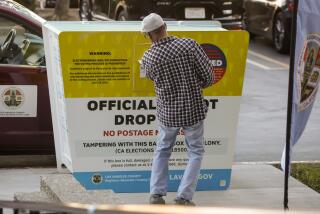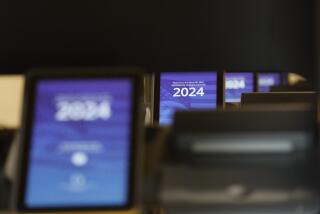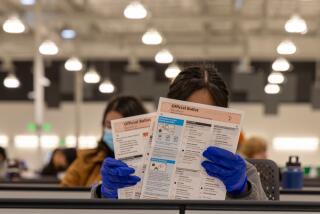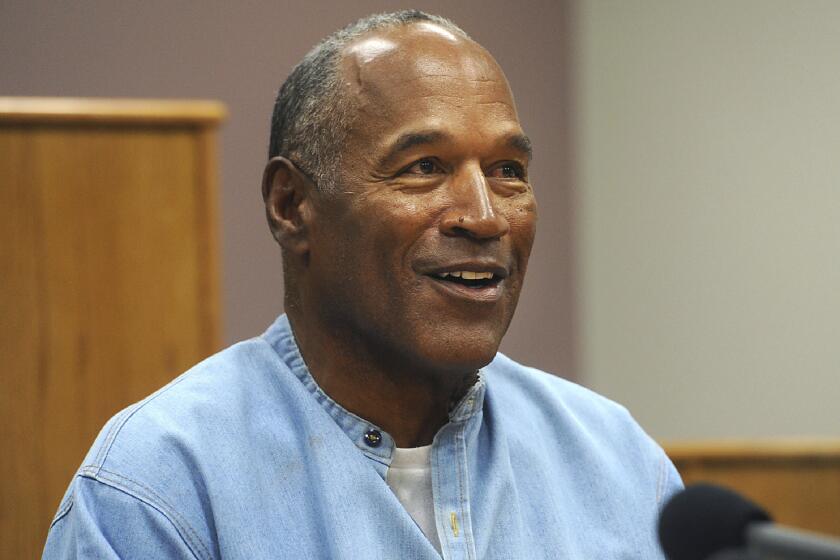Improving voter turnout a priority for secretary of state candidates
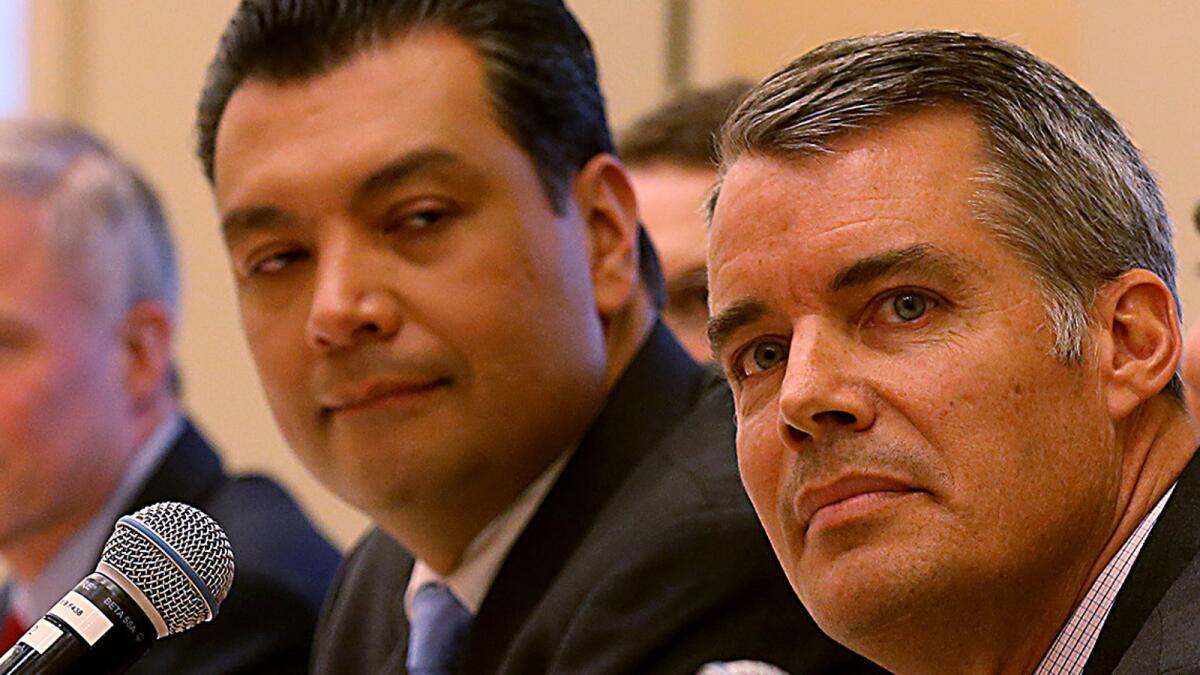
The record-low voter turnout in California’s June primary has added urgency to the contest for the state’s top elections post.
The two candidates — Republican Pete Peterson, the director of a public policy think tank, and Democratic state Sen. Alex Padilla — agree that a top priority is to get more Californians to the polls.
Activists concerned about the 25% turnout in June say this election is an important chance to turn things around.
“We need the next secretary of state to be a highly visible champion for expanding participation and improving the California election process,” said Kim Alexander, president of the California Voter Foundation, a nonprofit, nonpartisan group that advocates improving the voting process.
Her group doesn’t endorse in the race. “They are both strong candidates,” she said.
Both candidates agree the office has not performed well in recent years and has been plagued by delays in computer modernization as well as a lack of direction.
Current Secretary of State Debra Bowen, a Democrat prevented by term limits from seeking reelection, recently disclosed that she suffers from debilitating depression that has forced her often to work from home.
Padilla and Peterson have similar ideas for improving the function of the office; their biggest disagreement is over who is better qualified to get the job done.
Padilla, 41, of Pacoima, is finishing his eighth and final year in the Senate. An MIT engineering graduate, he was previously president of the Los Angeles City Council.
He said his legislative service puts him in a better position to improve the office, which depends heavily on action by lawmakers and the governor.
“When it comes to being able to be effective in changing policy in the Legislature, I’ve been there. I’ve done that,” Padilla said. “If we need to advocate for increased funding for the office, I’ve been there. I’ve done that with the governor, so there is no on-the-job training required with me.”
Peterson, a 47-year-old Santa Monica resident, is executive director of the Davenport Institute for Public Engagement and Civic Leadership at Pepperdine University. Peterson has a history degree from George Washington University and a master’s in public policy from Pepperdine. He previously led Common Sense California, a bipartisan, nonprofit group that worked to improve civic participation.
“I have a record of nonpartisan civic engagement and Alex does not,” Peterson said. “I also have a record of using technology to help government better engage its citizens. Alex has an MIT degree in engineering. I’m not sure how that applies to this job.”
The secretary of state, with about 500 employees, oversees state and federal elections in California and maintains databases that disclose campaign finances and lobbyist payments. The office also processes and maintains records related to corporations and other business entities.
Despite a big fundraising advantage by Padilla — and an overwhelming registration edge for Democrats — the secretary of state race is seen as one of the most competitive statewide contests and possibly the best hope for Republicans, who have not won an election for statewide office since 2006.
Both candidates support allowing in-person balloting before election day. “We are a real laggard in the area of early voting,” Peterson said.
They also support creating regional centers for early, in-person voting. To make that possible, Peterson said he wanted to explore replacing paper ballots with touch-screen voting.
“I think the technology is at a place where it can be trusted,” he said.
Peterson wants the state to do a better job promoting voting. He said electronic freeway signs should urge people to vote, just as they tell them to conserve water. “In part, voting is a marketing problem,” he said.
And he wants to enable voters to use hand-held devices to find their polling place and track their absentee ballot.
Padilla said he would support a move to electronic voting machines only if the results could be tested for accuracy and the systems could not be hacked.
“You have to be able to audit them for the integrity of the results,” Padilla said. He cited legislation he passed that expands the locations in state agencies where people can register to vote.
Padilla also has proposed making it easier to register to vote at the DMV, through universities and on the state’s new health benefits exchange.
Both candidates say improvements are needed for Cal-Access, the aging and unreliable state website that lists campaign finance and lobbyist activity. And they both support modernizing how business filings are processed — now still a largely paper-based function.
“Unfortunately, today it’s a frustrating experience,” Padilla said. He vowed to eliminate backlogs in business filings by processing them in five or fewer business days.
Peterson has proposed that the office collect data on why businesses are created and fold to help the state gauge whether it can do more to be business-friendly. He also has pledged to reduce the state’s $800 business franchise tax after conducting an audit to determine where the money goes. Some neighboring states’ tax is only $100 to $150, he said.
With significant union backing, Padilla has a big lead in campaign funding. He has raised $3.2 million as of Oct. 18, compared with $359,300 reported by Peterson.
Twitter: @mcgreevy99
More to Read
Start your day right
Sign up for Essential California for news, features and recommendations from the L.A. Times and beyond in your inbox six days a week.
You may occasionally receive promotional content from the Los Angeles Times.
